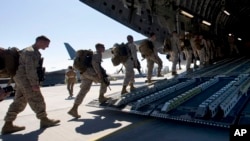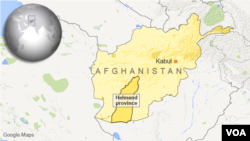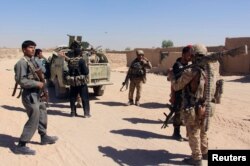The United States is readying a group of roughly 300 Marines to deploy to Afghanistan’s southern Helmand province this spring to assist local forces retake several districts lost to the Taliban during the past year and defend the provincial capital of Lashkar Gah, seen as the gateway to the rest of the country.
The city has come under repeated Taliban offensive in recent months, but Afghan forces have been able to prevent the fall of Lashkar Gah.
Helmand, the largest poppy-growing Afghan province, has been the scene of intense fighting throughout 2016. Clashes are ongoing in parts of the province, particularly in and around a key district center, Sangin. Wednesday, missiles fired by Taliban insurgents landed in the center of Lashkar Gah, killing a civilian and wounding several others.
But newly installed provincial governor, Hayatullah Hayyat, appears confident Afghan forces with the help of American marines will prevail in the battlefield during this fighting season.
“We hope that we will expand the area and we will reach those people who are actually taken by the Taliban [and using them] as a human shields. We will be able inshallah [God willing] to extend our freedom and peace to their location,” he told VOA by telephone from Lashkar Gah.
‘A great step’
Hayyat welcomed the planned deployment of U.S. soldiers to Helmand, insisting their role will be limited to advising, mentoring and training Afghan forces.
“Sending additional number of advisors and soldiers to assist our guys in training and advisory role that is excellent because we need to develop our forces, their knowledge, their training and to equip our security forces. So, I think it is a great step and I am quite sure together we will achieve more in this insecure situation,” Hayyat said.
The U.S. Inspector General for Afghanistan Reconstruction in his report this week said that eight out of 14 districts of Helmand are under insurgent control or influence.
Governor Hayyat says Afghan forces have gained enough battlefield experience during the past two years and are better prepared to tackle Taliban insurgents in the coming warmer months when fighting is expected to pick up in Helmand and elsewhere in Afghanistan.
But Hayyat urged the Taliban to cease violence in favor of finding a negotiated solution to the war.
“The doors are open for them [Taliban]. I think the only way is that we should discuss and we should come to the table of negotiations, that is the only way which can take us to a prosperous country and also to a stable situation,” the governor added.
Helmand is the largest of all 34 Afghan provinces and shares borders with Pakistan and Iran. Afghan authorities accuse both neighbors of interference in their country and supporting the Taliban.
Calling on Pakistan, Iran
Governor Hayyat called on Pakistan and Iran to use their influence with the insurgents to help Afghanistan bring an end to the conflict before it engulfs their territories.
“I would like to call on these people [Pakistan and Iran] that if they like peace, the Afghans also deserve that. So, I think the only way [for the two countries] is to push or use their influence on the Taliban and other insurgents to come and talk [to the Afghan government],” the Afghan governor maintained.
Hayyat dismissed assertions Taliban leaders and commanders have returned to Helmand from their sanctuaries in neighboring Pakistan.
"I think, based on our intelligence information and investigative proofs that we have, they [Taliban] don't have a safe place here to live," the Afghan governor claimed.
He suggested Iran’s link to the Taliban could be aimed at fueling the insurgency in order to obstruct construction of dams in Helmand and neighboring provinces of Nimrozz and Farha, which share a border with Iran.
“I think Iran is keen that we should not stop this water,” the governor said.
Pakistan and Iran deny allegations of supporting the insurgent violence in Afghanistan and maintain they are making all possible efforts to promote peace and reconciliation between the warring sides.
Hayyat says he hopes President Donald Trump’s new administration will continue U.S. assistance for Afghan military and civilian reconstruction programs.
There are about 8,400 U.S troops stationed in Afghanistan as part of NATO’s Resolute Support mission, conducting training, ‘advise and assist’ missions, and counterterrorism operations against al-Qaida remnants and loyalists of Islamic State in Afghanistan.
U.S. officials say the 300 Marines deployed to Helmand will be the largest number of Marines operating in the country since 2014, when most American combats troops left Afghanistan.






